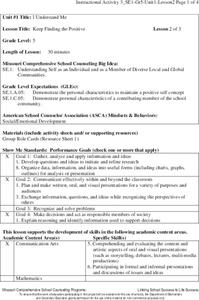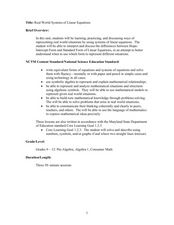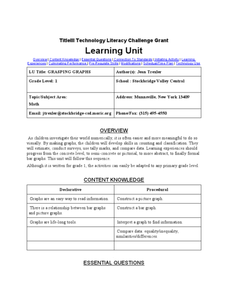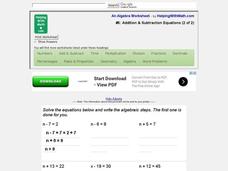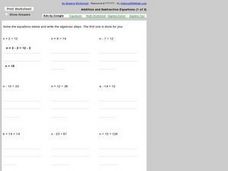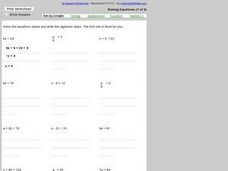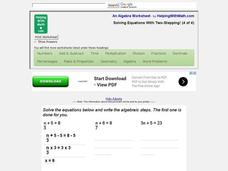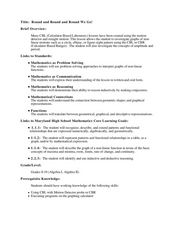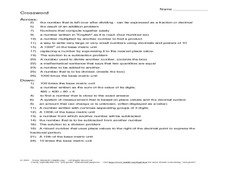California Education Partners
Science Fair Project
Plant the data firmly on the graph. Given information about the growth rate of plants, pupils determine the heights at specific times and graph the data. Using the information, scholars determine whether a statement is true and support...
Purdue University
Design of an Earthen Dam for a Lafayette Neighborhood
How do dams support bodies of water? Scholars engage in a hands-on STEM activity where they design, build, and test dams to learn about bodies of water and how humans use natural resources. They learn how criteria and constraints affect...
Missouri Department of Elementary
Keep Finding the Positive
Group members take on roles to create a positive classroom community. Learners perform their role—leader, recorder, presenter, timekeeper, encourager, and collector—in preparation for a formal presentation of their positive thinking...
Curated OER
Real World Systems of Linear Equations
Students solve systems of equations with fluency. In this algebra lesson, students graph, use elimination and substitution to solve systems of equations. They identify the point of intersection using algebra.
Curated OER
Technology Literacy Challenge Grant Learning Unit
First graders explore counting and classification. They sort leaves, create graphs, write sentences for the data in the graphs, develop graphs for shapes, favorite animals, birthdays, and participate in a die prediction game.
Curated OER
Graphing Regions: Lesson 2
Students identify and analyze geographical locations of inventors. They each identify where their inventor is from on a U.S. map, discuss geographic patterns, and create a t-chart and graph using the Graph Club 2.0 Software.
Helping with Math
#6: Addition and Subtraction Equations (2 of 2)
This printable contains 12 basic equations to be solved. The first one is worked out as an example, and the answers for all can be found by clicking on a "Show Answers" box found on the website. The publisher has identified this as...
Helping with Math
#5: Addition & Subtraction Equations (1 of 2)
Single-step addition or subtraction operations are applied in order to solve these 12 simple equations. An answer key is available, not so much for you, but perhaps to be used by learners as a self-correction tool. Note that the...
Helping with Math
#9: Solving Equations (1 of 2)
Twelve very simple equations are presented for learners to solve. What is the value of x? What is the value of n? Individuals apply operations to find the answers. You will find the final answers by clicking on the appropriate box at the...
Helping with Math
Solving Equations with Two-Stepping! (4 of 4)
Here are 12 two-step algebraic equations to be solved. The first problem is completed as an example to your class, but the remaining can be worked right on the page. An answer key is available by clicking on a small box at the top of the...
Helping with Math
Solving Equations with Two-Stepping! (2 of 4)
Multi-step problems are part of the progression when learning to solve equations. These 12 problems require only two steps to arrive at an answer. Either print the page out to assign as homework, or have learners write down the problems...
Helping with Math
#10: Solving Equations (2 of 2)
In this prealgebra activity, pupils perform addition, subtraction, multiplication, or division operations to solve for an unknown. There are 12 problems to be solved. Use this as a quiz to assess how well your class is grasping the skill...
Curated OER
Linear Functions-Learn Your Lines
Students solve and graph linear equations. In this algebra lesson plan, students collect and plot data on a coordinate plane. They use the CBL and TI calculator to graph systems of equation.
Curated OER
Identifying Fractions (2 of 6)
In this fraction worksheet, 3rd graders write the fraction that is shaded in both numbers in words. They fill in the blanks with what they would write to name the fraction and what they would say.
Curated OER
Identifying Fractions (4 of 6)
In this fraction worksheet, 3rd graders write the fraction that is shaded in both numbers in words. They fill in the blanks with what they would write to name the fraction and what they would say.
Curated OER
Identifying Fractions 2
For this fractions practice worksheet, students examine 10 fraction graphics, write each of the fractions, and record how to say each of the fractions.
Curated OER
Identifying Fractions 3
In this fractions practice worksheet, students examine 9 fraction graphics, write each of the fractions, and record how to say each of the fractions. An example is included.
Curated OER
Technology - Chaos Theory Lab
Ninth graders gain an understanding of Chaos Theory that exists in one's everyday environment.
Curated OER
Round and Round and Round We Go!
Students investigate motion using a CBL. In this algebra instructional activity, students collect and graph data on a coordinate plane. They define and identify amplitude and period of conic graphs.
Curated OER
Regressive Music
Student use the Ti calculator to graph sinusoidal graphs. In this calculus activity, high schoolers use the CBL to collect and analyze data of sinusoidal graphs. They manipulate their collected data and make predictions.
Curated OER
Pythagorean Theorem
Students investigate the Pythagorean Theorem. In this seventh through twelfth grade geometery lesson plan, students explore the Pythagorean Theorem and its converse and use it to find the length of the missing side of a right triangle.
Curated OER
Scientific Notation
Sixth graders are introduced to and practice the concept of scientific notation. Following a brief description of scientific notation and a demonstration of how to convert numbers to scientific notation, 6th graders practice writing...
Curated OER
Rounding Numbers
Fifth graders demonstrate rounding numbers to a sensible level of accuracy and in context. They discuss rounding numbers for newspaper headlines, complete a table of grocery items that need to be rounded, and observe and demonstrate...
Curated OER
Crossword Puzzle: Decimals Vocabulary
In this crossword puzzle: decimals vocabulary worksheet, 6th graders fill in the puzzle using the clues and math vocabulary words.




